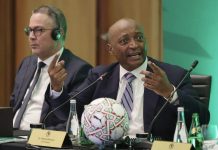Africa-Press – Mauritius. The second inquiry of’Adrien Duval during the Prime Minister’s Question Time carried the electoral promise for the creation of’an electoral college charged with’elire the president and the Speaker of the’ National Assembly. « Can the Prime Minister state where things stand? », he asked.
Ramgoolam : After 56 years of’independence, it is opportune to consider constitutional and electoral reforms in order to further consolidate our democratic institutions, especially after the way in which the previous regime undermined all our institutions. It is precisely to consolidate our democracy that the proposal to set up’an electoral college for the’election of the President of the Republic was included in the government’s electoral manifesto. Electoral College is a process by which a group of’-electors is formed to elect a candidate for a particular position.
The concept of electoral colleges is not new and is known in several democracies around the world. For example, countries like’India and’Germany are using electoral colleges to elect their president. In France, the Senate is elected by an electoral college. Each of these countries has its own electoral college model adapted to the local context and the specificities of its electoral system. The establishment of’an electoral college in Mauritius will be an integral part of my Government’s reform agenda and we will hold consultations with all stakeholders.
Duval : Does the Prime Minister acknowledge that’il s’il was committed during the electoral campaign to appoint the President of the Republic by an electoral college? I will ask Prime Minister S’il is not of’accord with the fact that the outgoing president could have remained in office pending the appointment of a new president through the electoral college, as he S’y is himself engaged.
Ramgoolam: I do not agree with’Honorable Member. We have a new government. The president’s term is over. He resigned at the time his term expired; he S’is withdrawn. That’s why we need to replace the president and vice president until we make the reforms we’ve committed to.
Duval : Does the Prime Minister not’ agree that the Constitution already provides that the outgoing president can remain in office until the incoming president is in office and that, because the term of office of’a president is five years, it will not be under this government that a new president will be elected by the electoral college, as he S’y is engaged?
Ramgoolam: I do not agree with the honourable Member’s point of view. The president, as I’ai said, agreed to resign after the’election of a new government and the end of his term. This is how we proceeded to the appointment of the new president and the vice-president. We can’t let things stand by because, you know, it would be an eternal argument if that’ were the case. That is why we have followed the procedure and elected a new president, as has always been the case, but we will bring the reforms that we have committed to bring.
Speaker: I think the Prime Minister has answered your question. You can do this, but do not be argumentative and do not return to the same subject.
Duval : Can I ask the Prime Minister, given that the new president and the vice-president are in office, if’il plans, once the electoral college is set up, to ask the president to leave his post until’il is appointed again through this system? S’il does not do so, he would then not keep his promise to’elire the president under his mandate through the electoral college…
Speaker : He gave an answer. You may not’ agree with his answer, but I think I will no longer go into this matter further. There is also a part on the choice of the president of the’ National Assembly. Maybe you want to answer this?
Ramgoolam: That is the same thing, Madam President, we should allow Mr Phokeer to remain President. It’ is precisely what you say when you saw what the difference was.
Adrien Duval returns to the charge to ask if the government will keep its word.
Ramgoolam: That promise will be kept. We will examine that. I’ said it in my introductory response. J’ai said that’there would be consultations, broad consultations with all stakeholders, because we have to look at all aspects and we will stick to what we said.
For his part, the deputy Francisco Francois, leader of the’Organisation du Peuple de Rodrigues also discussed electoral reform in Rodrigues. Navin Ramgoolam replied that his government is committed to a comprehensive reform of the current electoral system, which will take into account the will of the population and « will restore the democratic reputation of our country ».
« To this end, consultations will be conducted with all stakeholders. The need to establish a committee competent to review constitutional and electoral reform will be discussed during this process », s’is-il appesanti
MP Ram Etwreea, speaking at the Prime Minister’s Question Time he asked the Prime Minister about security in the north. Navin Ramgoolam noted that the northern coastal areas comprise 17 regions, starting from the Goulet and ending at Roches-Noirs. These areas are very popular among tourists and local residents, he said.
« J’has been informed by police commissioner qu’in the last three years, 1,120 cases of theft have been reported to police in northern coastal areas. C’that is from 2012 to 2024. M’ is also informed that the police have put in place several measures to closely monitor the situation. In other words, bicycle and mobile patrols are carried out daily by the regular police. Several police units have been mobilized for this purpose. In addition, special units of the SMF are deployed at night to carry out mobile patrols and roadblocks in strategic locations of the island, including, therefore, the northern division. Thirdly, the’ crime prevention unit regularly conducts awareness campaigns in residential and commercial areas, as well as in hotels, etcto raise public awareness of crime prevention measures », replied Navin Ramgoolam.
The Prime Minister makes it clear that proximity monitoring programmes have also been set up in these regions in order to obtain the’ membership of the entire community in the fight against crime, including theft. Fourth, safe urban cameras are used to monitor the movements of suspicious people and vehicles in order to provide a quick and coordinated response to requests for’aide from the police, he said.
« Following the appointment of the new police commissioner, the existing measures have been strengthened in order to revitalize the various police units on the territory of the island and ensure a more effective response to crime. The police force is reorganizing its workforce and will adopt a zero tolerance policy for all offenders, which is a deterrent against recidivism », says the Prime Minister.
He reaffirms that his Government attaches great importance to the safety of visitors and residents. « We must ensure that our country remains a safe destination, not only for tourists, but also for local residents », he concluded.
For More News And Analysis About Mauritius Follow Africa-Press







